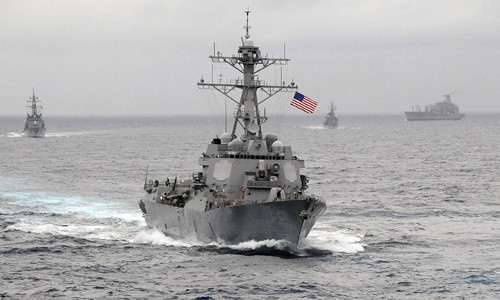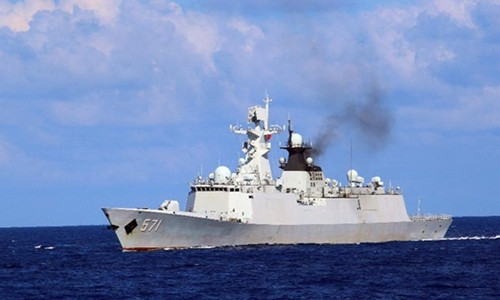The 'cow tongue line' ruling could deepen US-China tensions
The ruling on the Philippines' "nine-dash line" lawsuit against China is expected to continue to aggravate the disagreements between Washington and Beijing.
 |
| US destroyer patrols near artificial islands built by China in the East Sea. Photo: US Navy |
“It will definitely deepen tensions and even lead to confrontation,” China’s ambassador to the US, Cui Tiankai, said hours after the UN-backed arbitration court in The Hague, Netherlands, issued its ruling on the Philippines’ case against China over the South China Sea dispute on July 12. “Ultimately, it will weaken the authority and effectiveness of international law.”
On the other hand, US officials expect the ruling from the Arbitral Tribunal, which rejects the legal basis of China's sovereignty claims in the East Sea, to be a premise to promote measures to resolve conflicts through diplomacy.
The ruling of the Arbitral Tribunal is "an important contribution to the common goal of finding a peaceful solution to the dispute in the East Sea," said Mr. Daniel Kritenbrink, director of Asia policy at the White House.
Both Mr. Kritenbrink and Mr. Cui spoke at a discussion session organized by the Center for Strategic and International Studies (CSIS). Their statements clearly reflected the difference in views on the East Sea issue between the US and China.
According to commentator Matthew Pennington from AP, although US President Barack Obama and Chinese President Xi Jinping have tried to promote cooperation to jointly solve global problems such as climate change, tensions in the bilateral relationship have continued to increase due to the problems in the East Sea.
Risk of conflict
Experts say the ruling from the Arbitration Court will deepen the disagreements between the two countries, although both sides have affirmed that they do not want the East Sea issue to affect bilateral relations.
Kritenbrink said Washington's stance was not driven by disagreements with Beijing, but he stressed that the US wanted to "maintain the rules-based international order".
According to Kritenbrink, if international law is broken and countries compete to increase their military power and make aggressive moves, this will only lead to "tragic consequences".
Mr. Cui, meanwhile, reaffirmed Beijing’s support for negotiations to resolve territorial disputes, but added that the ruling from the Arbitral Tribunal would dampen diplomatic prospects in the South China Sea. He also warned of the risk of conflict in the region.
Observers speculate that after the court's ruling, China could start building artificial islands at Scarborough Shoal, which is disputed with the Philippines, or re-establish its position to prevent the Philippine navy from resupplying troops stationed on the old warship Sierra Madre, which Manila has used as an outpost at Second Thomas Shoal in Vietnam's Spratly Islands since 1999. On the other hand, China could also declare an Air Defense Identification Zone (ADIZ) in the South China Sea or deploy fighter jets to the runways it illegally built in Vietnam's Spratly Islands.
In fact, Chinese Deputy Foreign Minister Liu Zhenmin even brazenly declared that he has the right to establish an ADIZ in the East Sea depending on the "level of threats China faces", regardless of the court's ruling.
 |
| A Chinese warship participated in an illegal exercise near Vietnam's Hoang Sa archipelago from July 5 to 11. Photo: Xinhua |
Amarjit Singh, senior advisor at IHS Country Risk, predicts that the US will now conduct "freedom of navigation" patrols and dispatch aircraft to the East Sea with greater frequency to reinforce the court's ruling.
However, Mr. Cui argued that such moves would threaten the safety of civilian and commercial vessels. He compared President Obama’s Asia pivot strategy to US interventions in Middle Eastern countries such as Iraq, Libya and Syria, implying that they could lead to chaos.
Anton Alifandi, Asia analyst at the IHS security and intelligence consultancy, said he was concerned about the prospect of a war breaking out, especially between the US and China.
But in the medium term, Alifandi said, China’s aggressive behavior is unlikely to escalate tensions to the point where the US would have to retaliate. “There is always a risk of miscalculation. That is the danger.”
"If one side adopts a brinkmanship strategy thinking that the other side will make concessions but it turns out to be a miscalculation, then things can quickly spiral out of control," Alifandi said.
Ashley Townshend, an expert from the United States Studies Center at the University of Sydney, Australia, also said the risk of conflict breaking out in the East Sea is very high.
According to Townshend, China is "fully aware of the risk of unintended escalation" but Beijing had to express its opposition to the court's ruling due to pressure from within the country.
Losing the arbitration case to the Philippines, a US ally, “was a bitter pill for China to swallow,” Townshend said. “We’re talking about a country where people really believe in the historical narratives that they’re told. They have a very strong national resonance.”
"That is a big motivation for China to act in the East Sea," Townshend said.
On the other hand, after the ruling, if Beijing pushes ahead with the construction of artificial islands at the disputed Scarborough Shoal with Manila or makes it difficult for Philippine forces stationed on the Sierra Madre ship, Washington will certainly have to react strongly, based on the 1951 US-Philippines mutual defense treaty, commented Time writer Mark Thompson.
“We have reached a critical turning point,” said Jerry Hendrix, a retired US Navy captain now at the Center for a New American Security, referring to the ruling by the Permanent Court of Arbitration in the South China Sea case.
"The US, especially the navy, now needs to consider specific plans to support the international community as well as contribute to maintaining the rule of law. All options need to be considered," he emphasized.
According to VNE
| RELATED NEWS |
|---|








